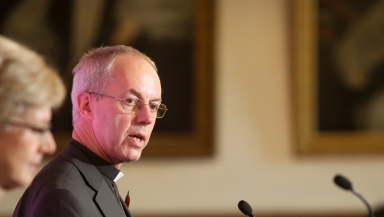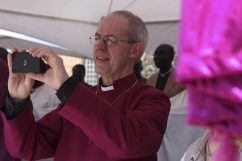
The Archbishop of Canterbury thinks there's too much 'moral claptrap' in sermons these days. Justin Welby drew praise and fire in equal measure this week with his comments - made during an address in New York - about modern preaching. But while some were stung by his comments, they undoubtedly had a ring of truth about them.
Speaking at Trinity Wall Street, he said: "[Jesus doesn't] permit us to turn religion into morality. The old sermons that we have heard so often in England, which I grew up with, which if you boiled them down all they effectively said was: 'Wouldn't the world be a nicer place if we were all a bit nicer?' That is the kind of moral claptrap that Jesus does not permit us to accept."
Anyone who actually listens during sermons knows exactly what the Archbishop is talking about, and precisely why the practice he describes is so attractive. As a preacher, it's hard to resist the desire to be liked, and tied up with that, the temptation to be inoffensive. A gospel of 'niceness', explained with some witty stories and a bit of lightly-challenging personal application, is almost guaranteed to leave the punters smiling, nodding, and remarking to one another about how marvellous your preaching is. An intoxicating proposition indeed.
At the other extreme are those sermons which leave no-one smiling. Preachers who seem so angry about sin and those who purvey it that you're worried he's going to step down into the congregation and begin punching people at random. Joyless, graceless homilies which suggest God demands instant, total change from us, or else. No hint of personal connection, no stories, and absolutely no humour in any circumstances; just an unswerving focus on The Cross and why it should make us feel terrible about ourselves. Many of us have sat through a few of those too, and we've probably needed a stiff drink afterwards. I certainly don't think this is the route Welby is proposing.
In the middle of the two however, there's a formula for great preaching to be found, drawing the personal connection and application from the first example, and maybe just a little dose of gravitas from the second. In his New York talk, Welby suggested that preachers should prompt congregants to "a revolution of expectation and implementation". In other words, fill people with hope, draw them closer to Jesus, and help them to act like him. Those are great directions for any preacher, and help us to formulate a few ideas about what good preaching looks like...
Preach hope
Welby said Christians should be looking at each other with 'bursting and boundless hope for our future as a society'. Whatever might be going on in our lives when we hear it, good preaching helps us to stop for a moment and see a vision of how things could change and be made better.
Preach Jesus
The Jesus which Welby describes is compelling - the foot-washing revolutionary who dies all for love. When we're presented with a random passage from Leviticus and asked to unlock its meaning, it's easy to become lost in trying to make a strange and archaic-sounding section of the Bible seem relevant to modern culture. I've certainly prepared and preached sermons which forgot that Jesus is the very epicentre of our faith, and didn't return ultimately to him. Good preaching never does that; it always puts Jesus front and centre, and leaves the congregation wanting to draw a little closer to him.
Preach action
If we had to boil the Archbishop's point down even further, it might simply be stated as: quit moralising, compel people to love. This is the 'implementation' of which he speaks: we take the grace that we have received in being loved and accepted by God, and we let it loose on the world around us. Good preaching gives people something to 'do' as a result of what they've heard; it applies the passage to their everyday world and asks them to get involved in making it a better place.
Alongside Welby's guidance, I'm offering a couple of other points of my own - definitely not drawn from years of personal preaching disasters...
Don't make jokes for the sake of it
I think the desire to be liked by our congregations, whether we're aware of it or not, can have a damaging effect on our preparation. It's great to be witty and engaging as a speaker, but when we start throwing in amusing stories in order to placate our audience or keep them awake, then we're probably both wasting their time and using up a section of the preach in which scripture could have been speaking to them. The old 'open with a joke' rule feels a bit tired now, and we've grown to expect it. Humour is great. Jesus used it lots, but he always had a reason for doing so.
It's not all about meee...
Some preachers give nothing away about themselves. At the end of the sermon, you don't know if they're married, where they live, or even what they like to do on a weekend. This style makes it very difficult for congregants to connect with. By contrast, some of us talk rather too much about these things; every sermon point becomes an illustration about the last time we went to the vet.
Always come back to the cross
The Cross and Resurrection of Jesus isn't just the centre of the Christian message - it is the Christian message. When we confuse that with a moral call to be nicer and change the world a bit, we fall into exactly the (clap)trap which Welby describes. So I believe all sermons should not just refer to that, but take people directly to it, and offer an opportunity to accept Jesus and his call for the first time. We should always assume that there are people listening to us who haven't taken that step of committing.
Should the Archbishop of Canterbury be criticising the imagined 'average sermon'? Some people were unhappy that he did. Personally, I'm glad that he's challenging all preachers to communicate the person and the message of Jesus more faithfully. 'Claptrap' might describe some of the things we jot down in the rush of last-minute sermon-prep, but it certainly doesn't describe the true message of Christ.
Martin Saunders is an author, screenwriter and the Deputy CEO of Youthscape. Follow him on Twitter @martinsaunders

















